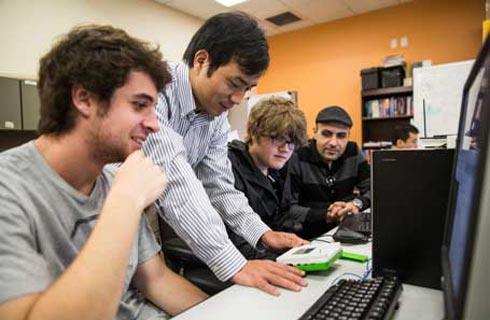- IDP China>
- 课程库>
- 工程与技术>
- 工程>
- 农业工程与生物工程>
- Doctor of Philosophy in Biomedical Engineering - Data Science and Computation
生物医学工程哲学博士-计算系统与合成生物工程
Doctor of Philosophy in Biomedical Engineering - Data Science and Computation

学历文凭
Ph.D.

专业院系
Department of Bioengineering

开学时间

课程时长

课程学费

国际学生入学条件
IDP—雅思考试联合主办方

雅思考试总分
7.5
- 雅思总分:7.5
- 托福网考总分:90
- 托福笔试总分:160
- 其他语言考试:DUOLINGO : 125 or higher
CRICOS代码:
申请截止日期: 请与IDP联系 以获取详细信息。
课程简介
Systems and synthetic bioengineering are complementary emergent fields that combine experimental, computational and theoretical methods to solve challenging biomedical problems. Systems bioengineering is based on a holistic approach of integrating large amounts of molecular information to elucidate the relationship between genotype and phenotype. This multi-scale understanding of biological systems will help answer important questions about physiological systems, human disease, and therapeutic strategies. Synthetic bioengineering is the design and construction of biological systems from molecular biological components for useful purposes. Such systems have applications in a wide range of complex biomedical problems. Among the greatest challenges in these fields are how to obtain, manipulate, and interpret massive datasets. Research in this area also requires a multi-scale understanding of the system of interest, from molecules to cells to organisms to ecosystems. Computational systems and synthetic bioengineering draw from a wide range of specialties including mathematical modeling, scientific computing, signal processing, molecular biology, and high-throughput technologies to provide a unique approach to solving biomedical problems.
相关申请
 预科
预科 奖学金
奖学金 实习机会
实习机会 在校学习
在校学习 跨境学习
跨境学习 校园授课-线上开始
校园授课-线上开始 在线/远程学习
在线/远程学习
开学时间&学费
学费信息仅供参考,请与IDP联系以获取详细信息
| 开学时间 | 时长 | 学费 | 地点 |
|---|
学校排名

世界排名201
数据源:
泰晤士高等教育世界大学排名
关于犹他大学

犹他大学位于美国犹他州的盐湖城市,是一所综合性公立大学,由耶稣基督后期圣徒教会信徒建立。学校截止2012年约有30,000学生及4,000多名教职员工。大学共分11部门,获得好评的学科则有商科、传播学、美术、计算机科学、工程、采矿、以及化学等自然科学。犹他大学为美国太平洋十二大联盟会 Pacific-12 Conference(原Pac-10)成员。该联盟目前由由美西十二所著名大学组成,成员包括加州大学伯克利UCB,南加州大学USC,加州大学洛杉矶UCLA,斯坦福大学,亚利桑那大学UA,科罗拉多大学,华盛顿大学UW-Seattle,俄勒冈大学OU等。犹他大学具有完整的学士、 硕士及博士学位,拥有73个系和94个研究学科。在校学生人数约为26000人,分别来自全美50个州和全世界109个国家。犹他大学近八成学生都获得校内兼职工作,因离盐湖城Downtown较近,且有轻轨系统直通校内,学生的校外兼职机会也颇多。学习成绩优异的学生有机会进入学校的荣誉学院Honor College,获得更多的学术研究机会。犹他大学始建于1850年,是美国著名的公立大学之一。该校位于美国犹他州盐湖城,校园依山傍水、风景别致,距离周围的几个国家公园仅三个小时左右的车程,是美国国家公园环境的国家级大学。据抽样调查,1999年盐湖城被评为全美最佳居住城市之一。
本校相关课程

Master of Science in Special Education (with Licensure)
学历文凭
Masters Degree
开学日期
课程费用总额


统计硕士(数学)
学历文凭
Masters Degree
开学日期
课程费用总额


生物统计学统计学硕士
学历文凭
Masters Degree
开学日期
课程费用总额


Master of Social Work (MSW)
学历文凭
Masters Degree
开学日期
课程费用总额


国际事务和全球企业理学硕士
学历文凭
Masters Degree
开学日期
课程费用总额


Master of Arts in Political Science
学历文凭
Masters Degree
开学日期
课程费用总额

其他相关课程

生物工程哲学博士
 达尔豪斯大学
达尔豪斯大学学历文凭
Ph.D.
开学日期
课程费用总额


生物工程应用科学硕士
 达尔豪斯大学
达尔豪斯大学学历文凭
Masters Degree
开学日期
课程费用总额


生物工程学硕士
 达尔豪斯大学
达尔豪斯大学学历文凭
Masters Degree
开学日期
课程费用总额


Master of Science in Biosystems Engineering
 克莱姆森大学
克莱姆森大学学历文凭
Masters Degree
开学日期
课程费用总额


Doctor of Philosophy in Biosystems Engineering
 克莱姆森大学
克莱姆森大学学历文凭
Ph.D.
开学日期
课程费用总额


农业和生物系统工程理学学士
 北达科他州立大学
北达科他州立大学学历文凭
Bachelor Degree
开学日期
课程费用总额










